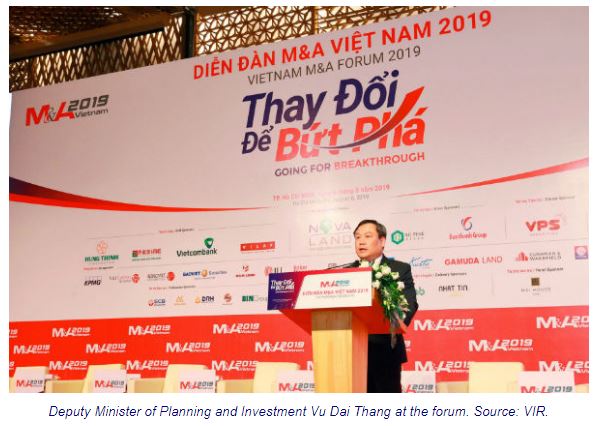Vietnam sees US$55 billion in M&A deals made in a decade
Over the past 10 years, M&A activities in Vietnam have been growing strongly and become an indispensable part of the investment – business ecosystem in Vietnam, Thang said at the M&A Vietnam 2019 Forum on August 6.In addition to a record-high value, the number of M&A deals has been increasing rapidly in all economic sectors, from the private, foreign-invested to state sectors, attracting both foreign and local investment funds, as well as non-specialized investors such as business and tech firms.According to Thang, the government has been pushing for economic restructuring based on a revision of growth model towards greater efficiency and economic competitiveness.During this process, a priority is given to reform in public investment, the finance-banking system and state owned enterprises (SOEs). Regarding the latter, there has been measures to promote speedy privatization and divestment process, Thang added.In the last three years, privatization and divestment in the state sector have resulted in proceeds of over VND200 trillion (US$8.6 billion), nearly double the amount in the prior five year-period, Thang continued.
Throughout these activities, local and foreign investors have purchased and owned major stake holding in state firms such as Vinamilk or Saigon Beer Alcohol Beverage (Sabeco).
The government’s push for privatization and divestment in a transparent and fair manner would lead to more attractive products for the M&A market, opening the door wider for investors having interest in acquiring stakes at SOEs, Thang asserted.
Additionally, Vietnam identifies the private sector as a driving force for the economy, as such, it aims to perfect the legal framework and policies for a better business environment.
New factors supporting M&A activities
Business-related laws such as the Investment Law, Law on Enterprises, Securities Law and Construction Law, among others, would soon be amended to remove restrictions and overlapping regulations, cutting business costs for enterprises joining the market.
Moreover, new laws, including the Law on Support for Small and Medium Enterprises, Public-Private Partnerships Law (PPP), are expected to create a solid legal foundation for the private sector participating in various business and investment activities, Thang continued.
More importantly, the Politburo, the most powerful policital body in the country, is scheduled to issue a new resolution on attracting FDI until 2030 that stresses the importance of foreign investment to Vietnam economy in competing and cooperating fairly with other economic groups.
Under the new FDI strategy, Vietnam gives priority to quality projects with high added-value, using advanced and environmentally-friendly technologies.
The government intends to pilot new management models for innovation and creative business activities, especially in a fast-changing world with new technologies arising from the Fourth Industrial Revolution.
These positive factors are opening a new era for M&A activities in Vietnam to become a major investment channel in the coming time, Thang concluded.


 Thailand
Thailand




